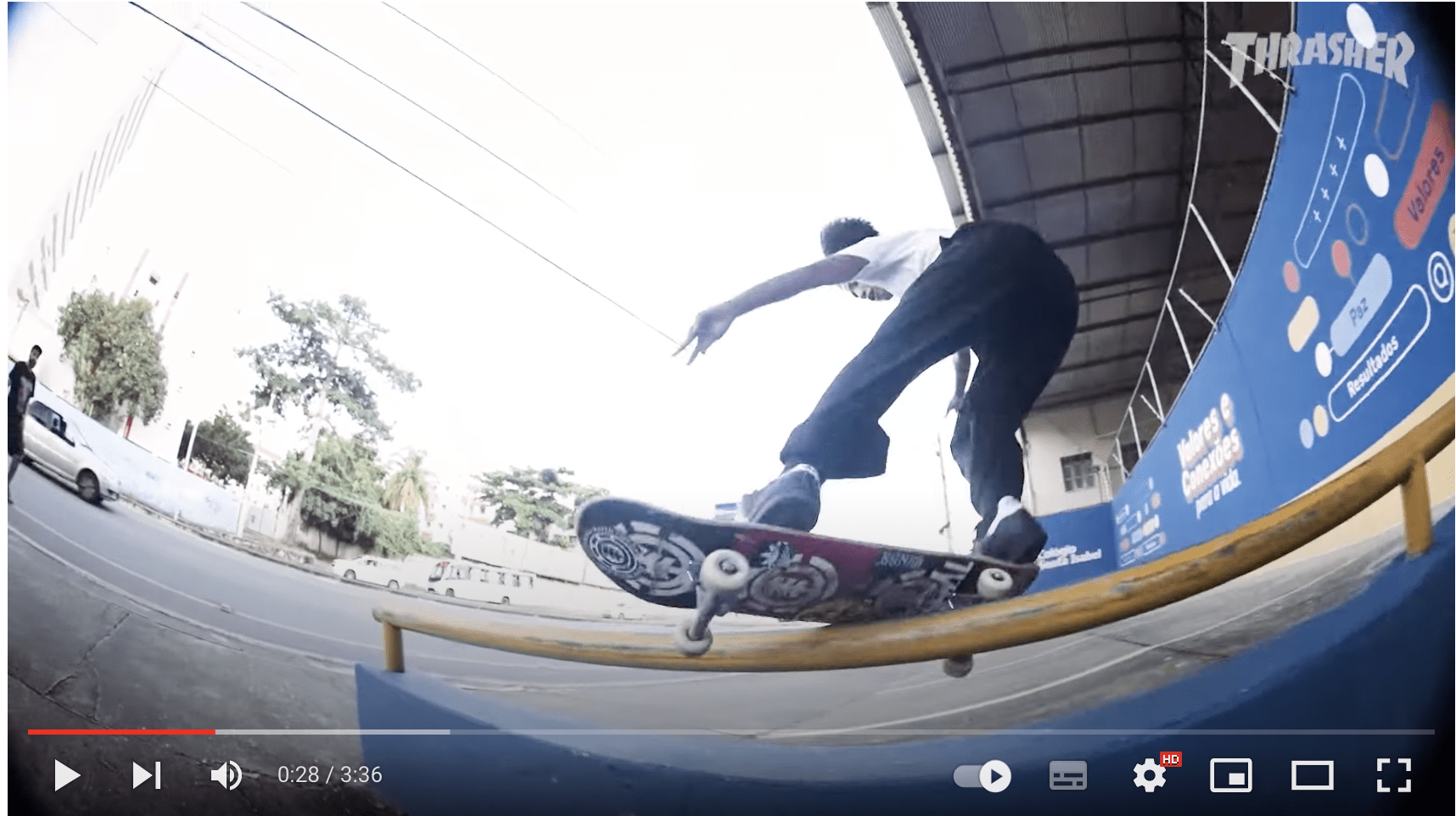Vitória Mendonça Turns Pro for Element
Vitória Mendonça turns pro for Element!
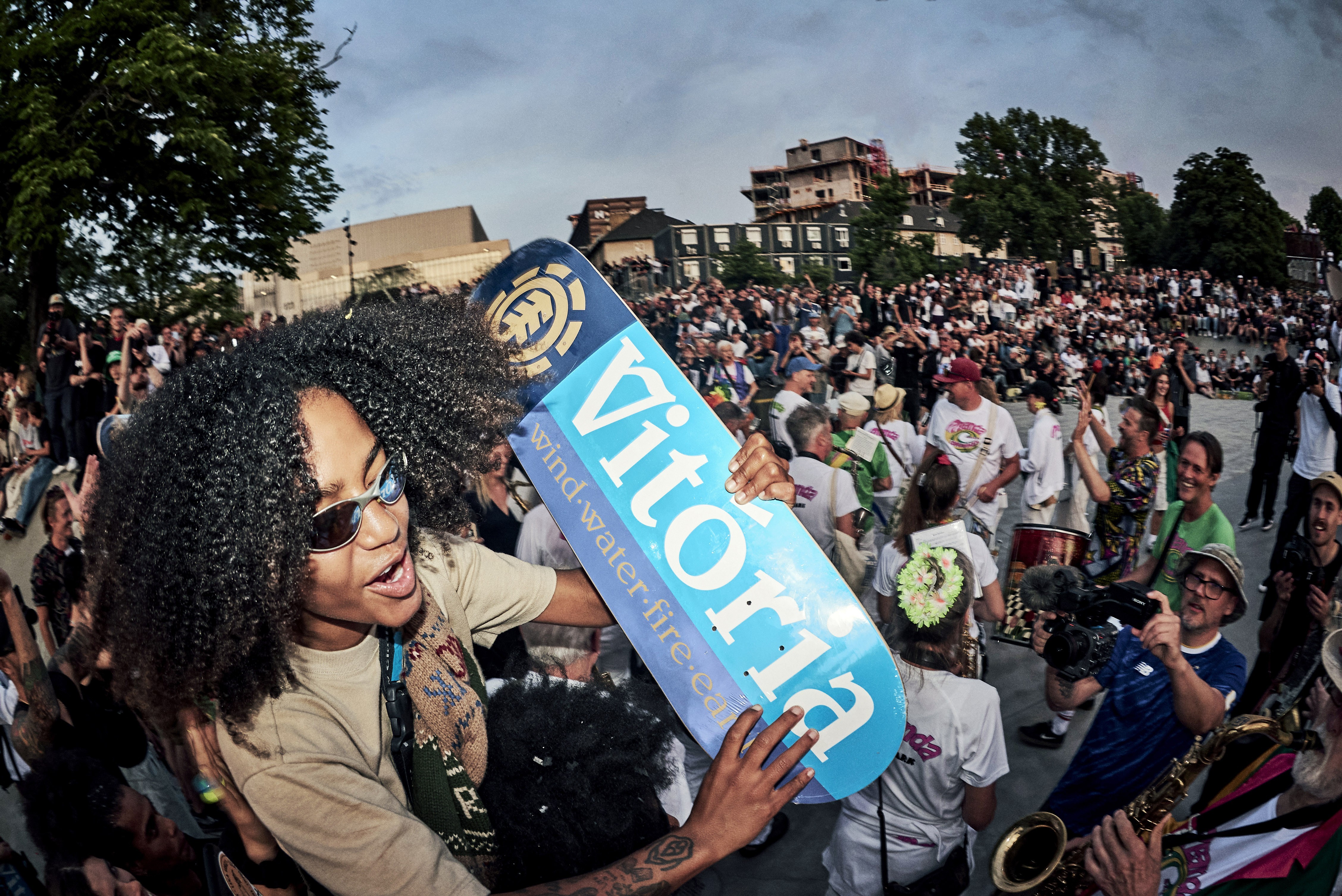
Campo Grande, a neighborhood in the western reaches of Rio de Janeiro is home to nearly one million people. It is so big that the neighborhood in fact became a city of its own in 1968. The city has significantly grown over the decades and its rural history has been all but replaced by a modern-urban landscape. Just as is the story in all corners of the globe, extraordinary people consistently emerge from these seemingly ordinary places. So, roughly three decades after the once pastoral Campo Grande became an urban hub, a girl called Vitória was born into this vast and bustling part of the world.
The continued urbanization of the area wound up offering young Vitória a concrete playground full of town squares, parks and a seemingly endless number of neighborhoods named after every saint in the book to explore. One day, the barefoot, grade school aged Vitória cast her futebol (Brazilians would be angry if we referred to it as soccer) aside at her local park and began to use the park’s mini ramp as a slide, glissading down its curved banks on a plastic soda bottle. The local skaters weren't upset, in fact they told little Vitória to come back the next day with sneakers and they would teach her to skate. That was it. No more futebol, no more plastic bottles. V was now a skater and her mom knew it. Despite the family being tight on expenses, for her next birthday Vitória got the item that would go on to shape her life.
She became the local ripper in the neighboorhood, catching attention in a country renowned for its skateboarding talent. Luckily for us, she caught the eye of the Element Brazil crew and began skating for Element when she was only 16. Now at 23-years-old, Vitoria Mendonça has since left Campo Grande for the skate capital of Brazil in São Paulo and as you read this she has just recently become the newest pro on the Element Global Pro team. She has simultaneously taken it upon her to use her platform as a way to inspire a new generation of young skaters from all walks of life. As someone who takes massive pride in her identity as a black, queer woman, Vitória knows that labels can act as a barrier. So while she continues to fall more in love with skateboarding, she hopes she can break those barriers for anyone who just wants to live… and skate. This is an exclusive interview with Vitoria Mendonça, the newest pro skater of Element Skateboards. Parabéns V, we are proud of you.
Watch Vitória's Pro Part Now Below.

Hey Vitória, we just wanted to have a little chat about what you're thinking about the world of skateboarding, where you're at in your life, and just try to get some thoughts on that, just a little conversation, you know?
Yeah. I'm excited all of this is happening because when I was a kid, it was my dream to be a professional skateboarder and now it's happening. And doing it with Element… for me, Element is one of the best brands, you know. I grew up skating some element boards so it’s a big thing to happen now in my life. And all the team is so cool, with all the homies so I think it's the best thing happening in my life right now.
Tell us a bit about yourself. Where are you from and where do you live now?
My name is Vitória Mendonça, I'm 23 years old, and I'm from Campo Grande - Rio de Janeiro, but I've been living in São Paulo for 5 years. When I'm not skateboarding, I enjoy spending time with my friends, singing, and playing the guitar.
What was it like growing up there? What would you say is the first feeling you get when you think of home?
Campo Grande is one of the largest neighborhoods in Brazil, it's almost like you don't need to leave there for anything. You're always discovering a new part of Campo Grande, and honestly, I don't think anyone has ever fully explored the neighborhood. When I think of Campo Grande, I remember my childhood with my friends, playing games, skateboarding on the ramps and streets, and the breaks we took to eat or drink something during our sessions.
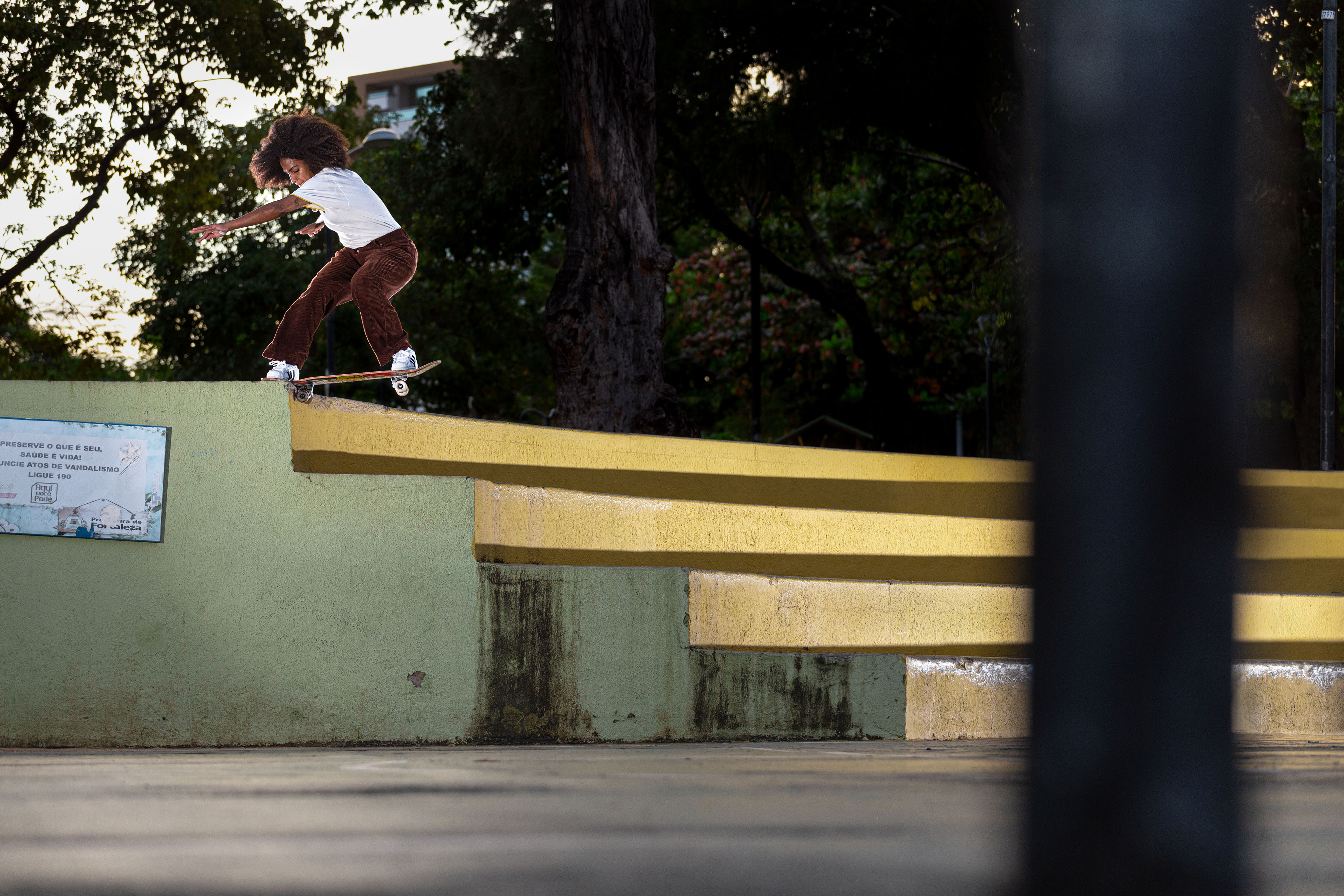
photo - Diego Sarmento
"When I was a kid, it was my dream to be a professional skateboarder and now it's happening... It's the best thing happening in my life right now."
How old were you when you started skateboarding?
Around seven.
And when Vitoria was seven years old in Rio, did you ever think “one day I'll be a professional skateboarder?”
When I was seven I was just, just skating and having fun, you know? At that time I didn't realiz oh, I wanna be pro one day.
Was there one moment where you thought, okay, maybe this could happen?
So, not at that time. When I was seven It seemed so far from me because my reality was so different. My family didn't have so many expectations you know? But when I was 12 and I realized, "oh, maybe I can live off skateboarding…I can be a professional skateboarder one day."
What do you mean by expectations?
Because when I looked at my family, I thought maybe I can't be professional because my family doesn’t have much money. So, at that time we didn't have enough money for food sometimes. Back in the days, like three years ago, four years ago, I really started to think “oh now I can do this”. When I moved to São Paulo five years ago, I realized more about this reality (of becoming pro).
What was the motivation, your motivation to go from Rio to São Paulo?
My motivation? Yeah, it was my dream. My dream to help my family and to help myself. To get there, in skating you know? To be a professional.
Now that you live in São Paulo. What is the main difference between the two cities, Rio and São Paulo?
Rio de Janeiro is a beach city, meaning it has less hustle and bustle and is smaller compared to São Paulo. São Paulo is more chaotic, where people are always in a hurry. In my opinion, in Rio de Janeiro, people lead a more relaxed lifestyle. But São Paulo is like what LA was for skateboarding back in the days. And here, you have all of the skate brands and more events happening.
Brazil has a rich skateboarding history and has had amazing skateboarders coming from the country for a long time. Since you started skateboarding until now, have you seen much of a change in the skateboarding culture in Brazil in any way?
Yeah, I have. You have more people skating; besides this we have many more spots to skate. I don't know maybe because of the Olympics, they're linked. Now you have more girls skating. In the neighborhood that I grew up in it was just me and one other girl skating. Now when I go to my hometown, you have so many girls skating, it's crazy now.
That's amazing because I could imagine that back in the days, it could have been kind of scary or intimidating for girls to be skating?
Yeah. Sometimes when I talk with my friends, we have had some bad experiences, you know, at the skate parks, at the street spots. But it's better than back in the days. But sometimes it is hard too, because sometimes the guys think oh, "she's skating for me; she needs to impress me" you know? It's crazy. But nowadays, I see that things are improving and people are realizing that there are no gender limitations. Women can skateboard too, and we can do whatever we want!
Brazil is a very diverse country but has a tough history with race relations. How does it make you feel being a young, black woman… especially one who has become a professional skateboarder?
Brazil has one of the highest rates of killings of black people. The rate of police violence here is alarming; it's literally leaving home without knowing if you will come back. I feel fear and at the same time, anger when I see another person like me being killed. Yes, I am very happy to be fulfilling this dream, and I believe it's an achievement that is not just mine, you know? I want people to feel that it is possible to fulfill a dream too, that despite the system, we are here resisting, achieving our dreams and being happy, healthy and alive!
You have become one of the most popular skaters from Brazil over the past few years, with that in mind do you see yourself as a role model for other black and female skaters in Brazil? Or even for people beyond skating?
I may not know personally as a role model, but I receive many messages from people in general, but mostly from Black girls, telling me that they are inspired by me, that they see me as a role model, and that strengthens me, you know?!
What would be one or two things that you would like to see change in skateboarding?
Uhh dayum. The feeling that sometimes that I'm skating for them (other people) and not for myself, you know? Yes. The feeling that I, I'm doing my trick and some guy is doing the same and looks at me or is like intimidating me. So sometimes this is happening not just to me, but with my friends too. So to feel safe, you know? Yes. For queer people to feel safe at the skate parks at street spots.
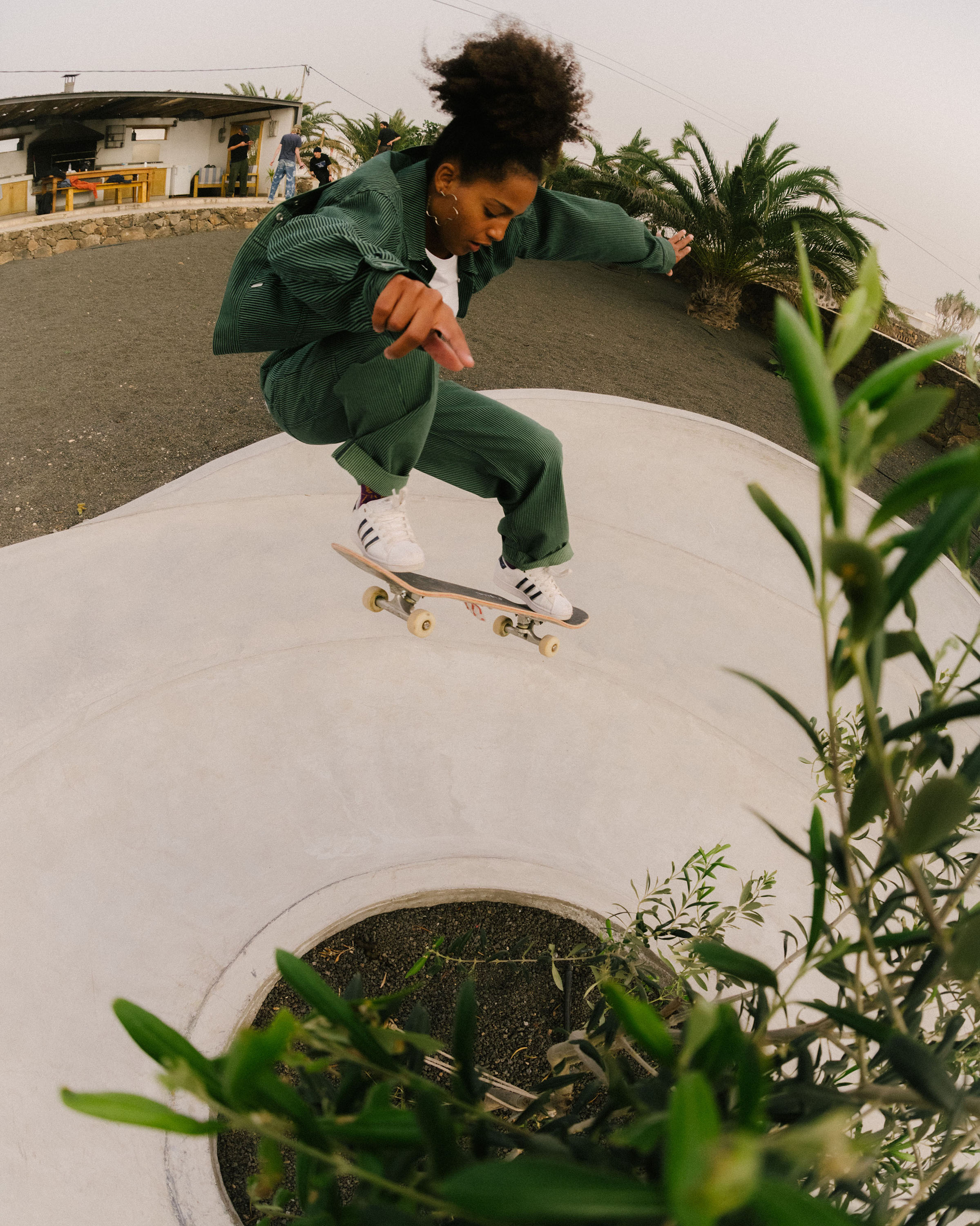
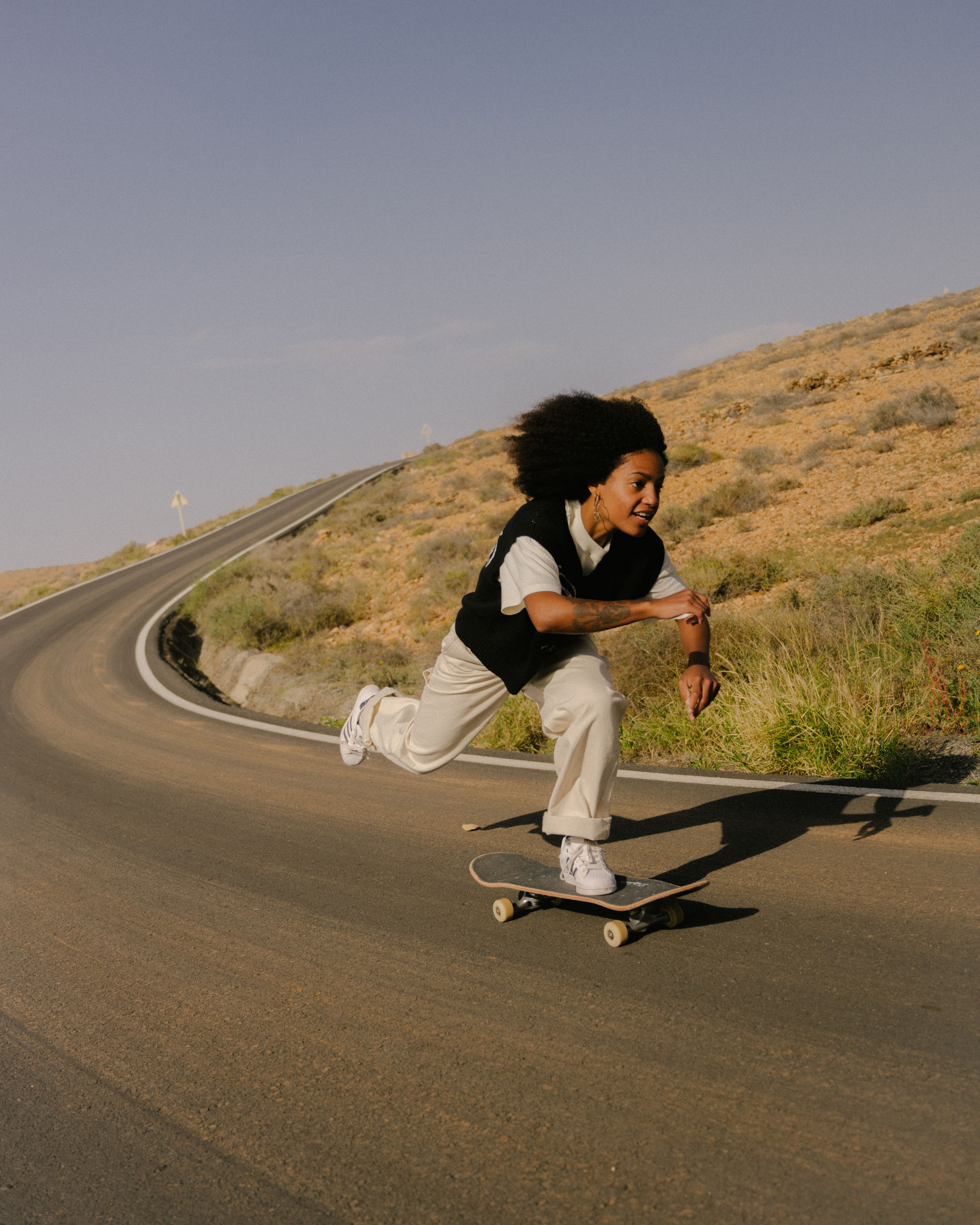
"It's also my dream to help people and to have more black girls skating and more black girls becoming professional skateboarders."
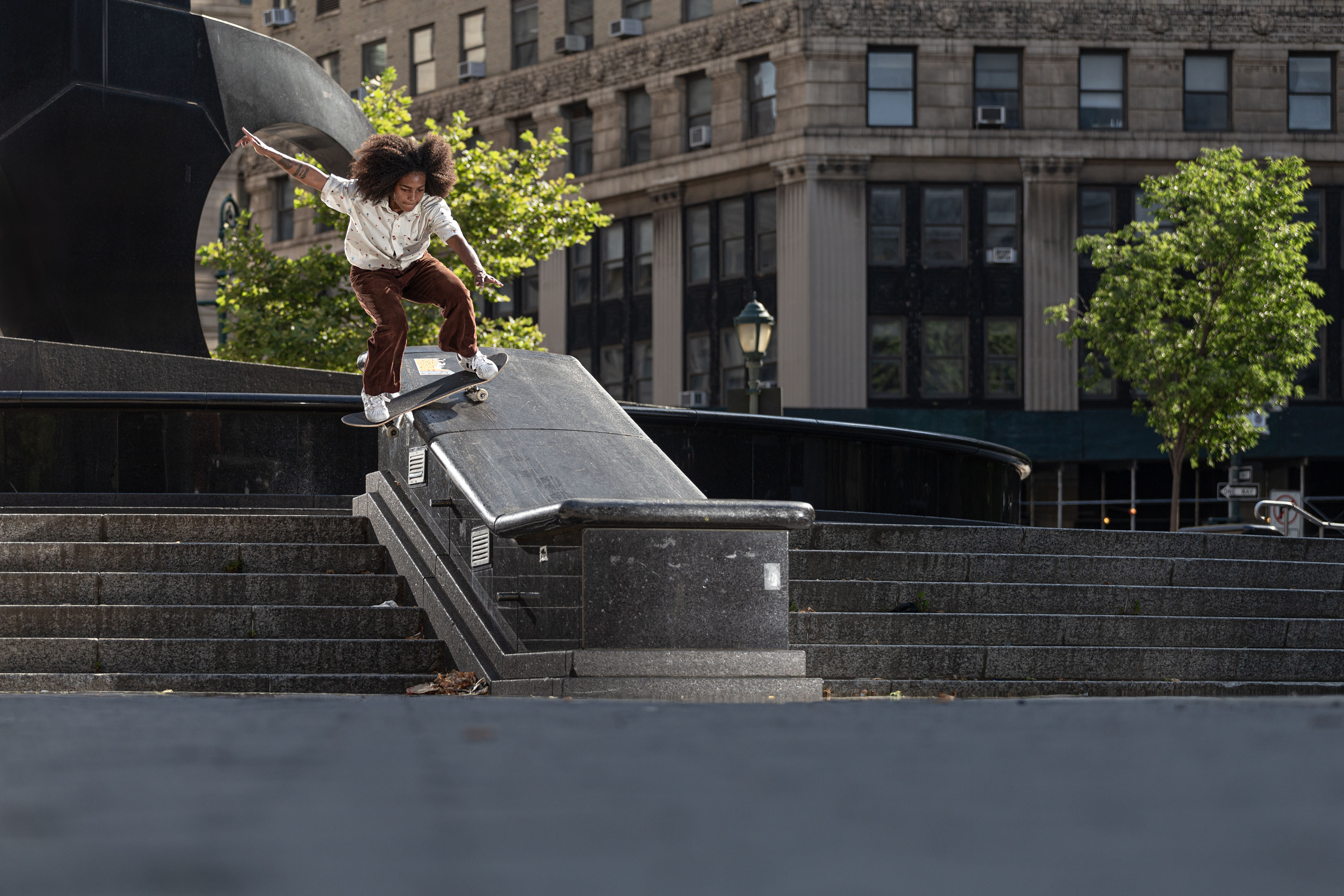
photo - Diego Sarmento
What was your overall experience like filming for the E.S.P. Vol. 2 video? The vibe, the trips… What was the feeling and maybe what was one of your favorite parts about filming for that video?
New York was my favorite because it was always my dream to go to New York. And I made so many good friends out there and I was so happy in Brooklyn. And I'm a big fan of Everybody Hates Chris, you know, the show? Haha. I was going into the streets in Bed-Stuy, knowing all the places.
The Chris Rock show?
Yeah haha. I love Chris Rock. And the heel flip to Firecracker was the most different for me because it is not really a trick that I usually do. It was crazy when I landed the trick. I was so happy.
What was the first impression when you arrived in New York? When you first arrived, how did you feel? What was the thought in your brain?
In my brain, I was like, "oh it is so similar (to Brazil)". It's so not similar, but it's just like the show Everybody hates Chris you know? It's this feeling of see many black people too. To see how they live and how they are and to feel so welcome there.
And where you're from, you have obviously a big black community in Brazil. But when you meet other black people in different countries, what does that make you feel like when you get to see people who look like you? To see how they live, or when you speak to them, what's the feeling?
It's like when you recognize someone and you feel like you don't really know the person, but you feel a connection. And when I come to New York, I feel a connection with everybody who I speak with on the streets. Even just an “oh, good morning" you know? So, it was crazy. It was crazy.
Immediate respect.
Yeah, yeah.
You got to work with one of the artists that helped to make one of your graphics, no?
Yeah. Jeff Cheung
What was that process like? How did your friendship with him begin?
I know Jeff from Instagram for a long time and last year we met at the at the CPH Open and again in Seattle. And we have a good connection and relationship because Jeff is doing a great thing for his community and for queer people. He now has a brand (UNITY) and only queer and LGBTQ + people are skating and working for the brand. It’s so sick to see this happening. And when Alex and Phil (Element team managers) told me that I'll become pro for Element, I was thinking of some artists that I like and Jeff came to my mind.
That's amazing. And have you seen the board yet?
No not the real board, but Jeff sent to me some some ads. I can’t wait to have it in my hands.
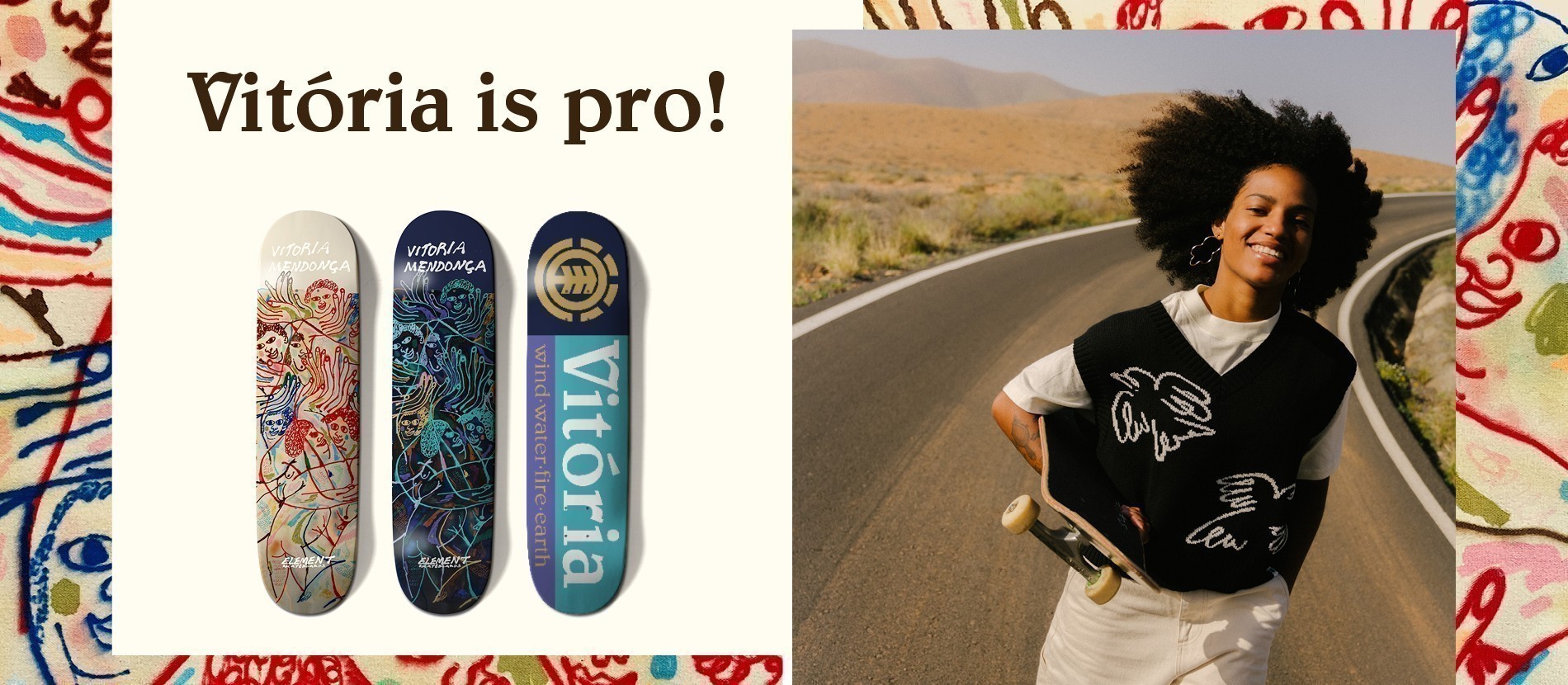
Okay. You are 23 years old. We're going back to 10 years ago. Vitória, would you have thought that one day you would be goingfrom Brazil one week the next week in the USA, the next week in Denmark and the following week to France, just to ride your skateboard?
No, no. Haha
How does that make you feel? And also what is the feeling from your family and your friends? They must be so proud of you.
Yeah my mom and my friends always say that (they are proud) to me. When I think about my dreams when I was 12 or 13 and then I think about what is happening now. It’s crazy. And I’ve been skating since I was seven, so for 16 years. And I’m so happy now. It is crazy, isn't it?
You are living the ultimate dream and somebody like you can maybe help somebody else one day, even just one person to achieve their dream, you know?
It's also my dream to help people and have more black girls skating and more black girls becoming professional skateboarders too. And maybe in a few years have a social project too to help some people with their skating, help to start skating and to have good decks and good material to skate, you know?
That's a great ambition. And if you're able to achieve what you've already achieved, for sure you'll go on to do everything else that you want to do.
Thank you!
